Catheter Procedure Minimally Invasive for Ventricular Septal Defect (VSD) treatment in Germany
Treatment prices are regulated by national law of the corresponding countries, but can also include additional hospital coefficients. In order to receive the individual cost calculation, please send us the request and medical records.
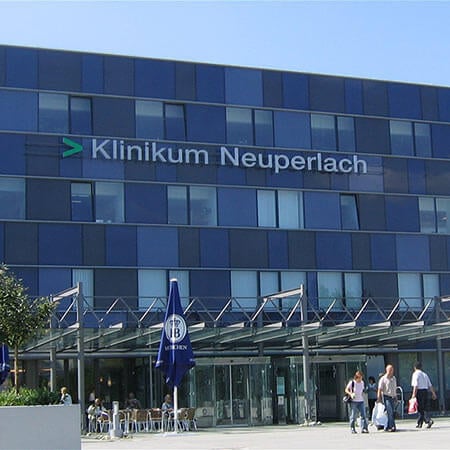
Department of Cardiology and Pulmonology
The Department of Cardiology and Pulmonology provides the full range of diagnostic and therapeutic services for patients with diseases of the cardiovascular system and lungs. In the field of cardiology, key attention is paid to the treatment of valvular heart disease, arrhythmias, heart failure, coronary artery disease, arterial hypertension and aortic diseases. The department's pulmonologists mostly deal with the treatment of pneumonia, bronchial asthma and chronic obstructive pulmonary disease. In addition, the department operates an Intensive Care Unit, within which patients can receive artificial ventilation, renal replacement therapy and procedures for maintenance of blood flow. The department's Chest Pain Unit is certified by the German Cardiac Society and provides medical care to patients with acute coronary syndrome. The department successfully uses in its clinical practice both proven classical treatments and innovative medical achievements, which are available only in leading European hospitals. The department's medical team provides treatment to more than 3,200 patients every year.


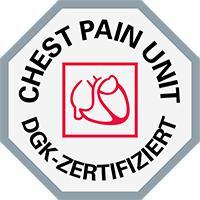
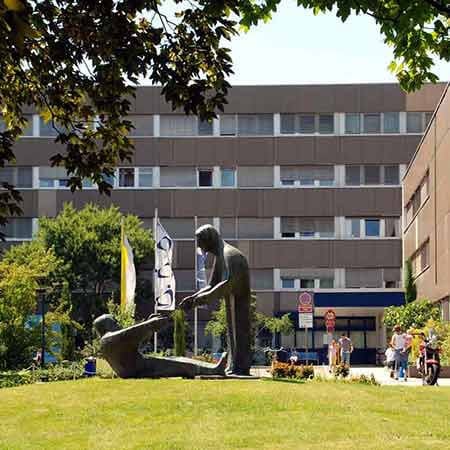
Department of Cardiology and Angiology
The Department of Cardiology and Angiology offers the full range of medical services in the fields of its competence. The department's doctors specialize in the treatment of congenital and acquired heart defects. The key focus is on catheter-based heart interventions, which are characterized by a minimal trauma rate and allow patients to avoid an open operation. For this purpose, the department has three modern Cardiac Catheterization Laboratories. The department also houses an Intensive Care Unit and a Chest Pain Unit for patients with acute coronary syndrome. The medical facility has 82 beds. The department was awarded the prestigious quality certificate from the German Cardiac Society (DGK) for outstanding results in the treatment of mitral valve diseases and acute coronary syndrome. Another important area of work of the department's physicians is comprehensive heart examinations for the prevention of heart disease. For this purpose, specialized Check Up Programs have been developed here, which include an optimal set of diagnostic tests. The medical facility employs a highly professional team of doctors and nursing staff, which makes every effort to provide each patient with effective medical care in a pleasant and comfortable atmosphere.
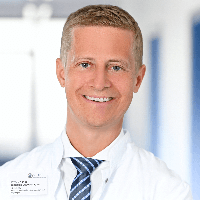

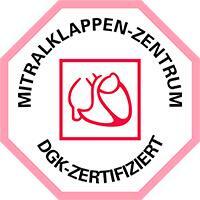
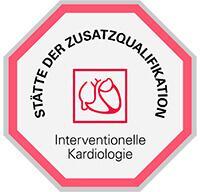


Department of Cardiology and Angiology
The Department of Cardiology and Angiology offers the full range of medical services in the areas of its specialization. The medical facility holds consultations and carries out the diagnostics and treatment of diseases of the heart and blood vessels. The department's team of cardiologists focuses on patients with valvular heart disease, heart rhythm disturbances, coronary artery disease, heart failure, and congenital heart disease. The department has a Chest Pain Unit certified by the German Cardiac Society (DGK) for the treatment of acute coronary syndrome. In the field of angiology, of key interest is the treatment of peripheral arterial occlusive disease, vascular stenosis of various locations, including carotid artery stenosis, and deep vein thrombosis. During the treatment of diseases of the heart and blood vessels, the department’s specialists use various drug therapy regimens and perform image-guided interventional procedures. The medical facility has been recognized with quality certificates for transcatheter aortic valve implantation (TAVI) and treatment of heart failure and mitral valve disease. Patients are treated by highly qualified physicians who strive to restore the patient's health using sparing treatment methods.
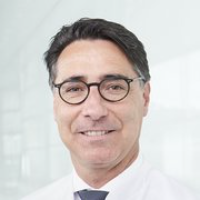





A ventricular septal defect (VSD) is a common heart defect that can be treated with open surgery or a minimally invasive transcatheter procedure. The second treatment option is less traumatic and involves the insertion of a catheter through the blood vessels in the leg. A catheter is used to deliver an occluder to the heart, which is fixed to the ventricular septum and closes the defect. Such procedures are available in German hospitals. You can find out the cost of treatment in Germany and make an appointment for your preferred dates on the Booking Health website. Our website offers the best hospitals in the world that admit foreign patients.
Content
- What is a ventricular septal defect (VSD)?
- When can a ventricular septal defect (VSD) be closed using a minimally invasive technique?
- How is a transcatheter procedure performed for a ventricular septal defect?
- Why is it best to undergo your treatment in Germany for a septal defect?
What is a ventricular septal defect (VSD)?
The ventricular septum is located between the right and left ventricles. It normally has no holes. In different parts of the heart, there is different blood: arterial and venous. These two types of blood should not mix.
If a person has a septal defect (VSD), blood can be discharged from the left ventricle into the right. As a result, not all blood enters the systemic circulation, and some returns to the lungs. The left ventricle may shrink, and the right ventricle and atrium may increase in volume due to constant overload. The following complications may eventually develop:
- heart rhythm disorders;
- heart failure;
- systemic embolisms, including strokes.
This happens only in the case of medium- and large-sized defects. Minor defects do not affect health, are not felt by the patient, and do not lead to heart failure.
When can a ventricular septal defect (VSD) be closed using a minimally invasive technique?
The minimally invasive procedure does not require any chest incisions. A patient does not have to endure discomfort after surgery and a long recovery time. In addition, the minimally invasive procedure is less likely to cause any complications as compared to surgery.
For these reasons, minimally invasive treatment for a ventricular septal defect (VSD) seems to be more attractive to patients than surgery because it is safer for their health and the treatment is easier to tolerate. A transcatheter technique, however, is not a first-choice treatment for most children so far because, in many cases, the procedure is complex or even impossible to perform.
Depending on where the septal defects (VSD) are located, they are of four types:
- infundibular;
- perimembranous;
- atrioventricular;
- muscular.
Perimembranous defects account for up to 75% of cases. These can be closed with a minimally invasive technique, but not always, and the procedure causes complications in some patients (up to 5% of cases). In different centers, the statistics are very different, since the outcomes are largely determined by the experience and skills of the doctors as well as the quality of the equipment used in the hospital.
Muscular ventricular septal defects (VSD) are usually easily closed in German hospitals using a minimally invasive procedure. The risk of complications is calculated in tenths of a percent. In addition, muscular defects are the second most common, accounting for 20% of cases. In adults, the prevalence is lower, as muscular defects often close on their own.
Other types of defects are usually treated with open surgery. They are too close to the heart valves, so doctors cannot safely and reliably perform a transcatheter procedure.
Defects are also classified by their size. They may be small, medium, or large, occupying less than 25%, about 25-75%, or more than 75% of the diameter of the aortic annulus. Small septal defects (VSD) usually do not need to be closed because they do not affect health. The middle ones can be closed using an endovascular technique. Large ones have to be closed with open surgery.
How is a transcatheter procedure performed for a ventricular septal defect?
A transcatheter procedure to close the ventricular septum is performed through an incision in the groin. Doctors use a catheter to bring the occluder to the heart. The catheter is inserted under X-ray guidance with contrast enhancement.
The occluder expands inside the heart. It is fixed to the septum and closes the defect.
Various types of occluders are used in German hospitals to treat ventricular septal defects, including the German Nit-Occlud Nit-Occlud (pfm - Produkte für die Medizin AG, Cologne), as well as the American Amplatzer or the more advanced Amplatzer Duct Occluder II.
Since the procedure does not require any chest incisions, the recovery time after it is minimal. Patients spend only one day in the hospital.
The success of the procedure, with proper patient selection and high-quality technical performance, is comparable to the results of open surgery and even exceeds them, since cardiac remodeling occurs in a shorter time. Symptoms disappear almost immediately. A day later, the first changes in the heart are observed, and a few months after the repair of the ventricular septal defect (VSD), the normal shape and size of the cardiac chambers are restored. The earlier the surgery is performed, the more complete the recovery will be. If the procedure is performed after the development of complications, cardiac remodeling does not occur as quickly, and the heart chambers are not fully restored.
Why is it best to undergo your treatment in Germany for a septal defect?
Doctors in German hospitals successfully treat ventricular septal defects using catheter-based techniques. Specialists in German hospitals have vast experience in performing such manipulations, and the occluder, which is produced in Germany, is used to close a ventricular septal defect in hospitals around the world.
In German hospitals, you will receive high-quality and safe treatment for your health. German doctors prefer endovascular procedures to open interventions whenever possible. Endovascular procedures can be successfully performed not only for muscular but also for perimembranous ventricular septal defects.
You are welcome to look up prices on the Booking Health website. Our website shows the real cost of treatment in Germany, at which point you can immediately make your treatment appointment. Booking Health's prices are lower than if you contacted a hospital in Germany directly. The cost of treatment in Germany will be lower due to the lack of additional taxes for foreign patients.
The Booking Health specialists will help you select the most suitable German hospital and take care of all the arrangements for your trip. We will solve all organizational issues, and you can fully concentrate on restoring your health.
Authors:
The article was edited by medical experts, board-certified doctors Dr. Nadezhda Ivanisova and Dr. Vadim Zhiliuk. For the treatment of the conditions referred to in the article, you must consult a doctor; the information in the article is not intended for self-medication!
Sources:
European Society of Cardiology

